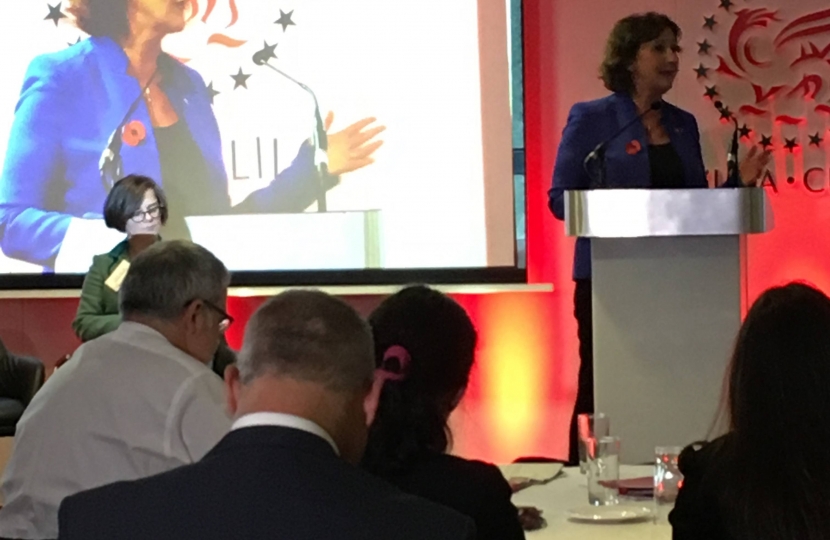
*Check against delivery*
Good Afternoon, Pryhawn Da,
I am pleased once again address your conference and to see so many elected members, leaders and senior officers here today.
I’ve also enjoyed chatting with some of you before this session.
I well remember the last time I spoke here, the discussion at the time was how to move forward in a time of increasing financial pressure, ‘Collaboration’ was the buzz word, and even then there was a note of guarded optimism in the air.
At that time many academics and experts in public service delivery were increasingly of the opinion that given the frequent financial challenges facing local authorities with ever-increasing demographic pressures on service provision, and years of monetary savings to be found, public service reform in its entirety, was a fundamental requirement and the sooner the better.
Looking back over the years since devolution, and particular since 2011, there has been a plethora of guidance, directives, measures, legislation imposed upon on local authorities in Wales, all designed to bring about some degree of change, when in reality it has simply been about rearranging the furniture, often then bringing a shift change to how our authorities work.
- 4 new pieces of legislation relating to local government organisation – including the Local Government (Wales) Measure and Local Government Democracy (Wales) Bill
- 9 new directives, compacts, and agreements – including 2012 Shared Purpose, Shared Delivery, and the Simpson Compact
That's 13 significant step change and statutory requirements for our local authorities to have to work around and respond to accordingly.
In addition to this, 12 reports giving various recommendations – including Simpson, KMPG, Williams
Then, of course, in 2014 - The Williams Commission Report on Public Service Delivery – which really set the hares running as regards local government reform!
However, there are many today who believe that it was a lost opportunity not to have taken public service reform forwards in its entirety, rather than just setting off on local government reform.
- In September 2014, we had the Invitation to Principal Authorities in Wales to submit proposals for voluntary mergers,
- The Local Government Wales Act in October 2015,
- Followed, of course, by the white paper Reforming Local Government - Power to Local People.
Never before have I known such a rift of opinion, and it has to be said, some huge and fierce resentment between Central and Local Government stretching way beyond any political divide.
Demoralisation amongst the ranks of long time serving officers.
Add to that the fact many of the 25 separate bills that have become legislation in the fourth Assembly term now impact directly on the statutory duties and already-stretched resources of our local authorities in Wales, such as the Active Travel Act, Social Care and Well-Being Act, Planning Act, Future Generations Act.
Across Wales we have seen some very good initiatives to deal with the financial challenges that present – improved collaborative working and innovative efficiency savings.
However, in some, cuts to very local amenities and services that play a major part in prevention and intervention, have been met with huge discord from our council tax paying residents.
Post-Assembly Election, I wasn't alone in welcoming the Cabinet Secretary's Statement on Local Government Reform, and feel that there is some new optimism in the spirit of this.
Having met with Mark Drakeford AM, I am confident of his genuine wish to bring about change in a more engaging way, and this, of course, is most refreshing.
As Welsh Conservatives we will want to work constructively in the coming months with the Minister on those areas that we can agree will bring about some robust stability, and resilience for our authorities, whilst at the same time ensuring our residents and council tax payers retain a level of certain confidence in the future efficient delivery of our vital services.
Regional Consortia in terms of Local Government was very much in the Plaid Cymru Manifesto and it has to be said that there is some disappointment that having failed in the fourth Assembly term to gain consensus, across the political divide that the Labour Government have ham-strung themselves to one political party only in their ideas going forward.
The model of regional arrangements to include the existing 22 authorities, and scrapping the model of 8 or 9 is new and I welcome further detail about the expected momentum by the Minister from Councils to change their own ways of working.
The plan to integrate Social Care and the Health Service within health board boundaries is interesting, however certainly in North Wales, it is no secret that the current geographical working of the health board has been considered too large and unwieldy, and given that they do remain still in special measures, one needs to be sure that this is indeed feasible.
Currently there are many Authorities already just getting on with it, having already taken great strides forward with their own collaboration arrangements working well across Local Authority boundaries, and on a steady footing of partnership arrangements already.
Some of course, even across the border with England also. It is therefore essential that these working relationships are not threatened, or put in jeopardy, as the Regional Partnerships Model emerges.
Be assured that we, as a party of opposition, will be constructive in our monitoring and challenging all progress as this agenda moves along
In closing, may I take this opportunity to thank you all for your fantastic efforts and commitment in your duties and I wish all of you standing for re-election again in May 2017 every success.
Diolch yn fawr iawn.
